Enduring mythology about these mass civilian slaughters warps thinking about U.S. militarism, writes Brian McGlinchey.
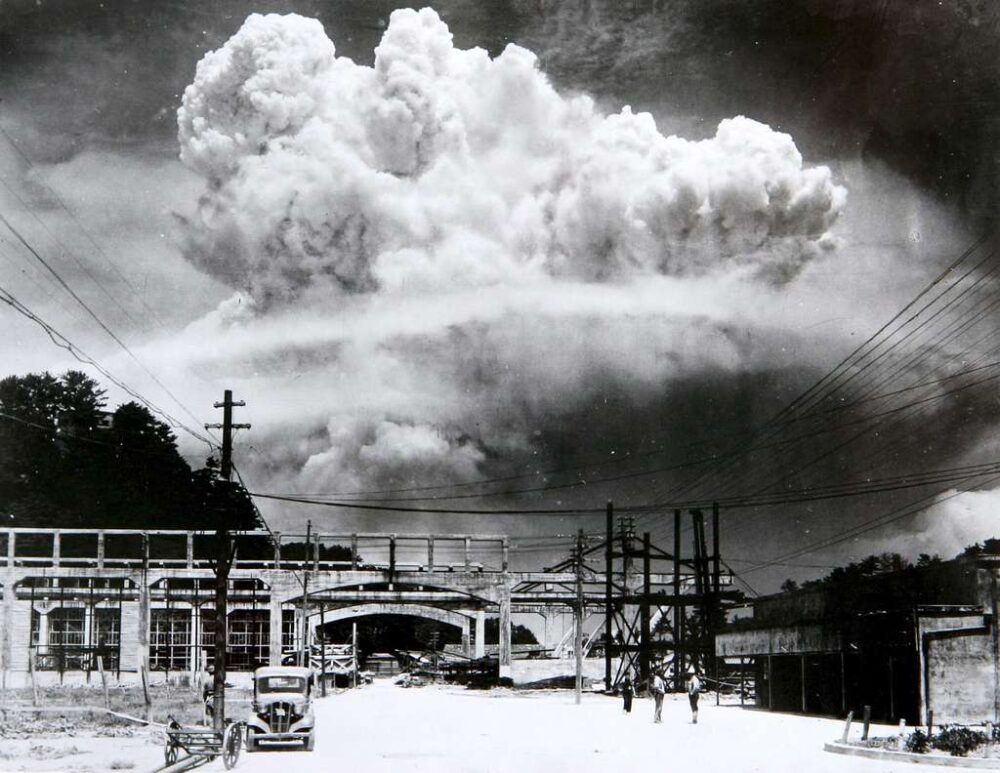
An atomic cloud hangs over the Japanese city of Nagasaki after the US dropped a second nuclear bomb on the country on August 9, 1945. (Creative Commons/Hiromichi Matsuda)
By Brian McGlinchey
starkrealities.substack.com
 The anniversaries of the atomic bombings of Hiroshima and Nagasaki present an opportunity to demolish a cornerstone myth of American history — that those twin acts of mass civilian slaughter were necessary to bring about Japan’s surrender, and spare a half-million U.S. soldiers who would have have otherwise died in a military conquest of the empire’s home islands.
The anniversaries of the atomic bombings of Hiroshima and Nagasaki present an opportunity to demolish a cornerstone myth of American history — that those twin acts of mass civilian slaughter were necessary to bring about Japan’s surrender, and spare a half-million U.S. soldiers who would have have otherwise died in a military conquest of the empire’s home islands.
Those who attack this mythology are often reflexively dismissed as unpatriotic, ill-informed or both. However, the most compelling witnesses against the conventional wisdom were patriots with a unique grasp on the state of affairs in August 1945 — America’s senior military leaders of World War II.
Let’s first hear what they had to say, and then examine key facts that led them to their little-publicized convictions:
- General Dwight Eisenhower on learning of the planned bombings: “I had been conscious of a feeling of depression and voiced to [Secretary of War Stimson] my grave misgivings, first on the basis of my belief that Japan was already defeated and that dropping the bomb was completely unnecessary, and secondly because I thought that our country should avoid shocking world opinion by the use of a weapon whose employment was, I thought, no longer mandatory as a measure to save American lives. It was my belief that Japan was, at that very moment, seeking some way to surrender with a minimum loss of ‘face’.”
- Admiral William Leahy, Truman’s Chief of Staff: “The use of this barbarous weapon… was of no material assistance in our war against Japan. The Japanese were already defeated and ready to surrender because of the effective sea blockade and the successful bombing with conventional weapons.”
- Major General Curtis LeMay, 21st Bomber Command: “The war would have been over in two weeks without the Russians entering and without the atomic bomb… The atomic bomb had nothing to do with the end of the war at all.”
- General Hap Arnold, US Army Air Forces: “The Japanese position was hopeless even before the first atomic bomb fell, because the Japanese had lost control of their own air.” “It always appeared to us that, atomic bomb or no atomic bomb, the Japanese were already on the verge of collapse.”
- Ralph Bard, Under Secretary of the Navy: “The Japanese were ready for peace, and they already had approached the Russians and the Swiss…In my opinion, the Japanese war was really won before we ever used the atom bomb.”
- Brigadier General Carter Clarke, military intelligence officer who prepared summaries of intercepted cables for Truman: “When we didn’t need to do it, and we knew we didn’t need to do it…we used [Hiroshima and Nagasaki] as an experiment for two atomic bombs. Many other high-level military officers concurred.”
- Fleet Admiral Chester Nimitz, Pacific Fleet commander: “The use of atomic bombs at Hiroshima and Nagasaki was of no material assistance in our war against Japan. The Japanese were already defeated and ready to surrender.”
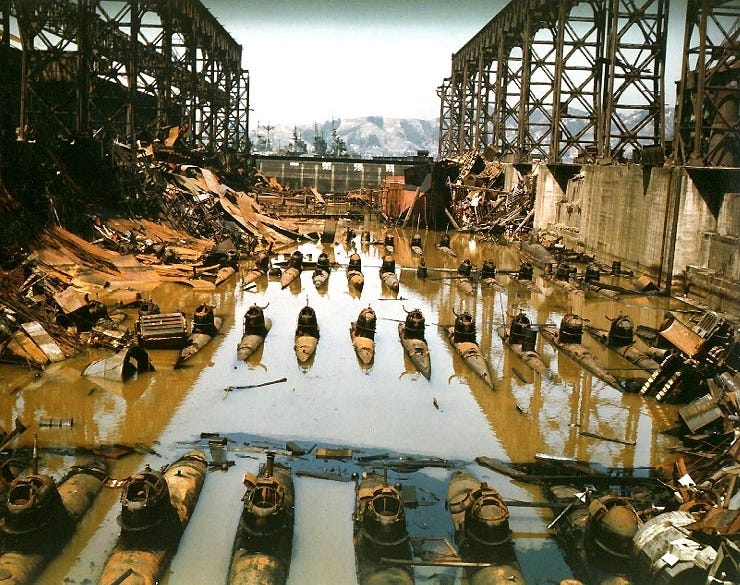
A drydock full of midget submarines lies in ruins in the port city of Kure, Japan. (Creative Commons/U.S. Air Force)
The Americans knew of Japan’s intent to surrender, having intercepted a July 12 cable from Japanese Foreign Minister Shigenori Togo, informing Japanese ambassador to Russia Naotake Sato that “we are now secretly giving consideration to the termination of the war because of the pressing situation which confronts Japan both at home and abroad.”
Togo told Sato to “sound [Russian diplomat Vyacheslav Molotov] out on the extent to which it is possible to make use of Russia in ending the war.” Togo initially told Sato to obscure Japan’s interest in using Russia to end the war, but just hours later, he withdrew that instruction, saying it would be “suitable to make clear to the Russians our general attitude on ending the war”— to include Japan’s having “absolutely no idea of annexing or holding the territories which she occupied during the war.”
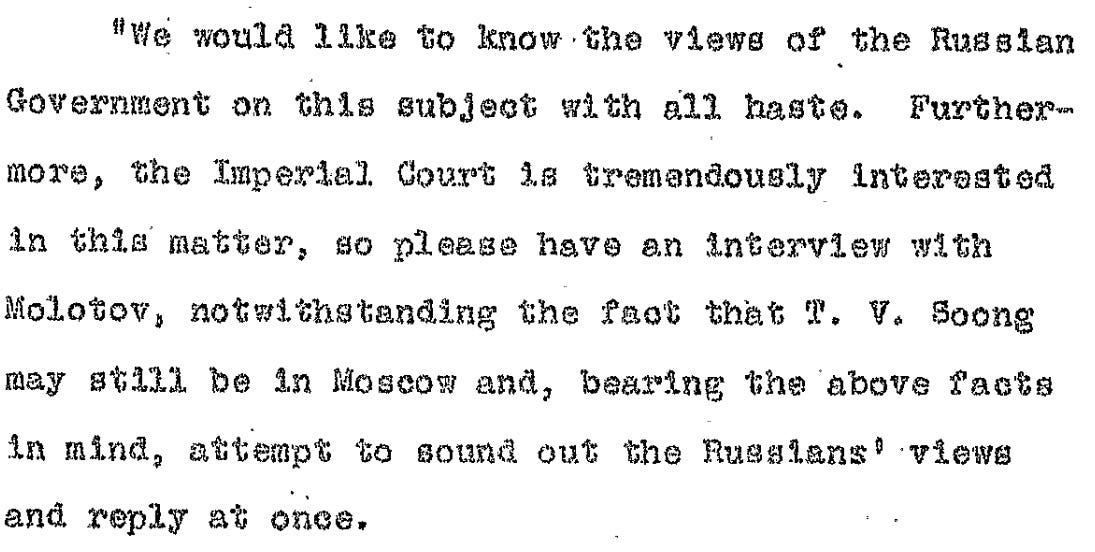
An excerpt from a July 12, 1945 US War Department summary of intercepted cables from Japan’s Foreign Minister to his ambassador to the Soviet Union.
Japan’s central concern was the retention of its emperor, Hirohito, who was considered a demigod. Even knowing this — and with many US officials feeling the retention of the emperor could help Japanese society through its postwar transition —the Truman administration continued issuing demands for unconditional surrender, offering no assurance that the emperor would be spared humiliation or worse.
In a July 2 memorandum, Secretary of War Henry Stimson drafted a terms-of-surrender proclamation to be issued at the conclusion of that month’s Potsdam Conference. He advised Truman that, “if…we should add that we do not exclude a constitutional monarchy under her present dynasty, it would substantially add to the chances of acceptance.”
Truman and Secretary of State James Byrnes, however, continued rejecting recommendations to give assurances about the emperor. The final Potsdam Declaration, issued July 26, omitted Stimson’s recommended language, sternly declaring, “Following are our terms. We will not deviate from them.”
One of those terms could reasonably be interpreted as jeopardizing the emperor: “There must be eliminated for all time the authority and influence of those who have deceived and misled the people of Japan into embarking on world conquest.”
At the same time the U.S. was preparing to deploy its formidable new weapons, the Soviet Union was moving armies from the European front to northeast Asia.
In May, Stalin told the U.S. ambassador that Soviet forces should be positioned to attack the Japanese in Manchuria by August 8. In July, Truman predicted the impact of the Soviets opening a new front. In a diary entry made during the Potsdam Conference, he wrote that Stalin assured him “he’ll be in the Jap War on August 15th. Fini Japs when that comes about.”
Emperor Seeks Surrender Talks
Right on Stalin’s original schedule, the Soviet Union declared war on Japan two days after the August 6 bombing of Hiroshima. That same day — August 8 — Emperor Hirohito told the country’s civilian leaders that he still wanted to pursue a negotiated surrender that would preserve his reign.
On August 9, Soviet attacks commenced on three fronts. News of Stalin’s invasion of Manchuria prompted Hirohito to call a new meeting to discuss surrender — at 10am, one hour before the strike on Nagasaki. The final surrender decision came on August 10.
The Soviet timeline makes the atomic bombings all the more troubling: One would think a US government that’s appropriately hesitant to incinerate and irradiate hundreds of thousands of civilians would want to first see how a Soviet declaration of war affected Japan’s calculus.
As it turns out, the Japanese surrender indeed appears to have been prompted by the Soviet entry into the war on Japan — not by the atomic bombs. “The Japanese leadership never had photo or video evidence of the atomic blast and considered the destruction of Hiroshima to be similar to the dozens of conventional strikes Japan had already suffered,” Josiah Lippincott wrote in The American Conservative.
A Deliberate Targeting of Civilians
Make no mistake, this was a deliberate targeting of civilian populations. Hiroshima and Nagasaki were chosen because they were pristine, and could thus fully showcase the bombs’ power. Hiroshima was home to a small military headquarters, but the fact that both cities had gone untouched by a strategic bombing campaign that began 14 months earlier certifies their military and industrial insignificance.
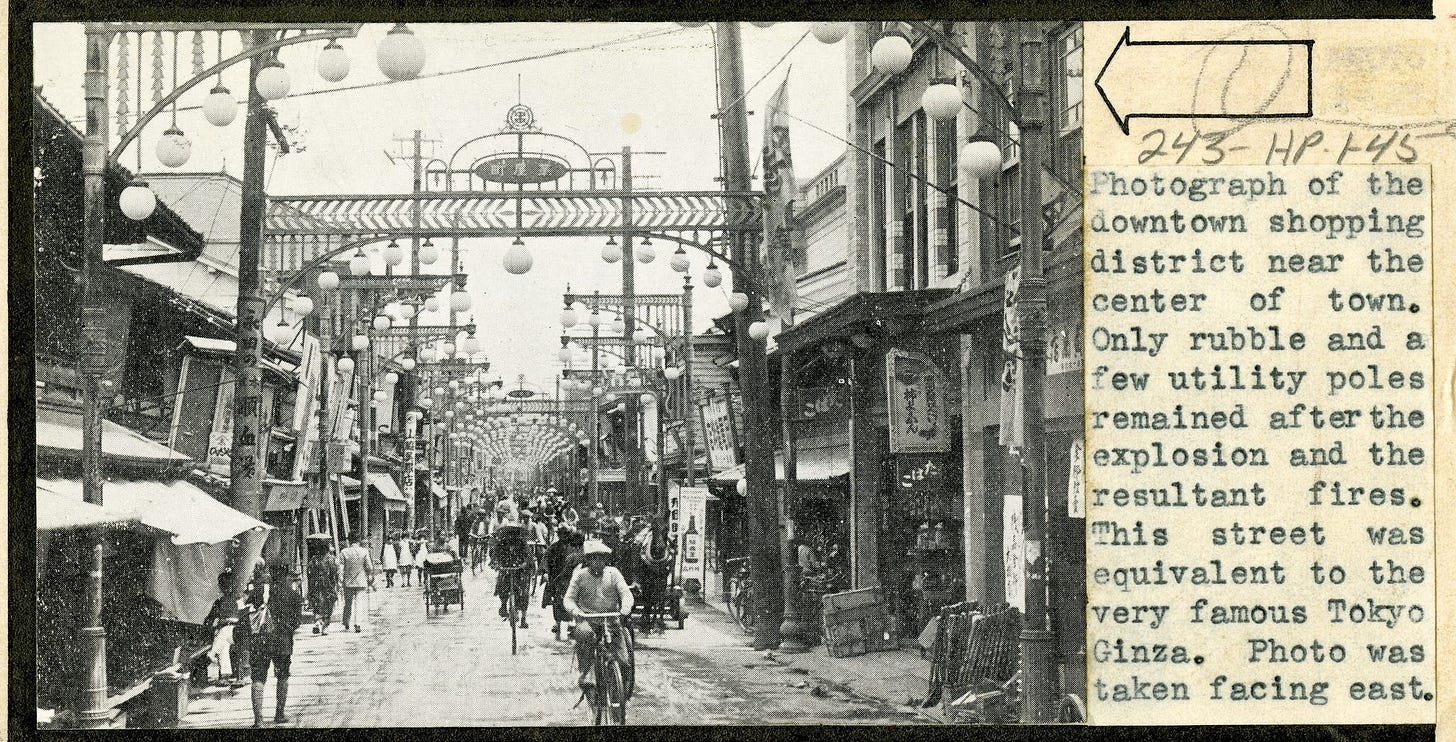
“The Japanese were ready to surrender and it wasn’t necessary to hit them with that awful thing,” Eisenhower would later say. “I hated to see our country be the first to use such a weapon.”
According to his pilot, General Douglas MacArthur, commander of US Army Forces Pacific, was “appalled and depressed by this Frankenstein monster.”
“When I asked General MacArthur about the decision to drop the bomb,” wrote journalist Norman Cousins, “I was surprised to learn he had not even been consulted…He saw no military justification for the dropping of the bomb. The war might have ended weeks earlier, he said, if the United States had agreed, as it later did anyway, to the retention of the institution of the emperor.”
Bombs Intended to Make Impression on Stalin – Physicist
A key insight comes from Manhattan Project physicist Leo Szilard. In 1945, Szilard organized a petition, signed by 70 Manhattan Project scientists, urging Truman not to use atomic bombs against Japan without first giving the country a chance to surrender, on terms that were made public.
In May 1945, Szilard met with Secretary of State Byrnes to urge atomic restraint. Byrnes wasn’t receptive to the plea. Szilard — the scientist who’d drafted the pivotal 1939 letter from Albert Einstein urging FDR to develop an atomic bomb — recounted:
“[Byrnes] was concerned about Russia’s post-war behavior. Russian troops had moved into Hungary and Romania, and Byrnes thought it would be very difficult to persuade Russia to withdraw her troops from these countries, that Russia might be more manageable if impressed by American military might, and that a demonstration of the bomb might impress Russia.”
Whether the atomic bomb’s audience was in Tokyo or Moscow, some in the military establishment championed alternative ways to demonstrate its power.
Proposal to Drop Bomb Over Forest Rejected
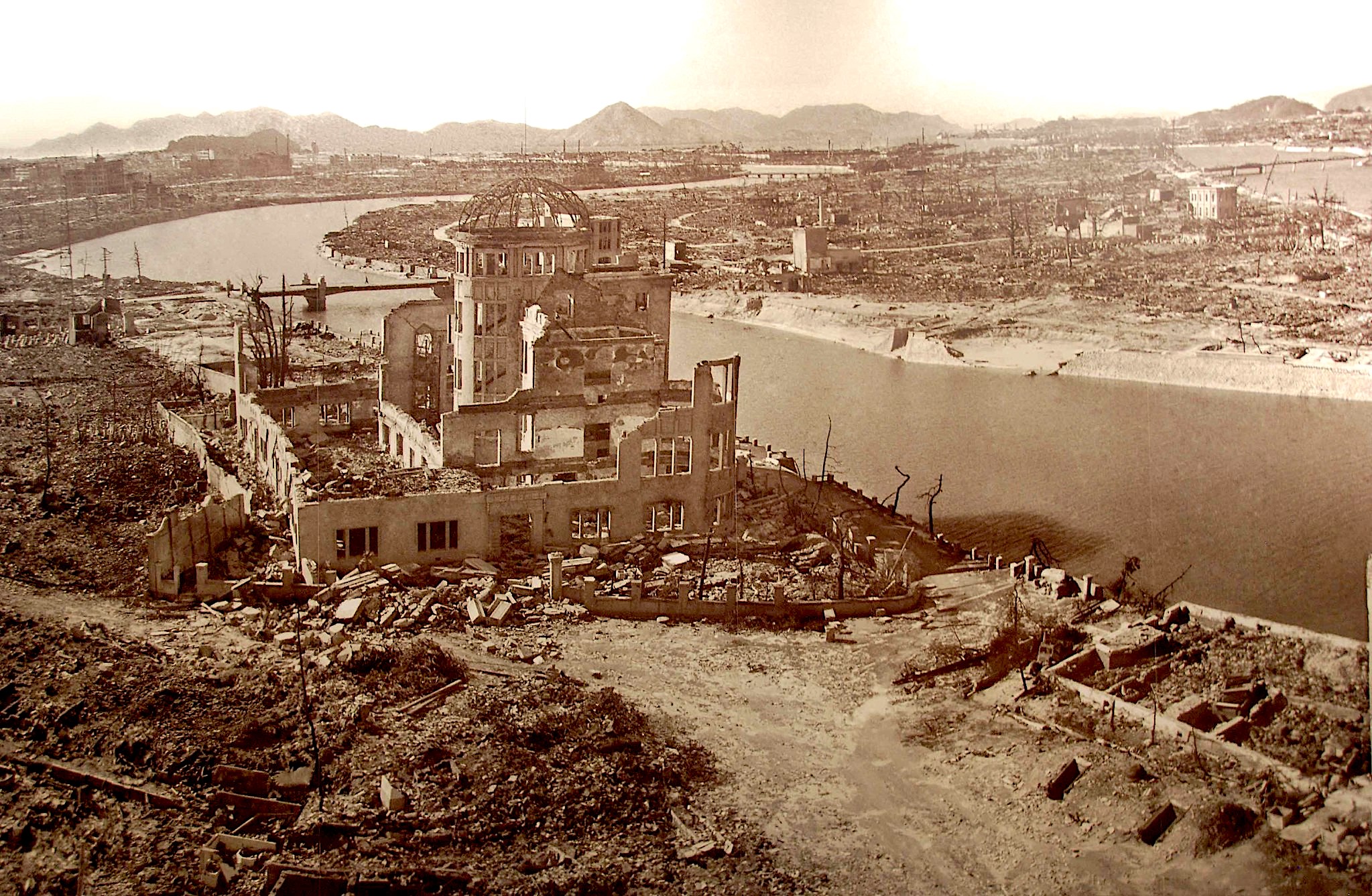
Devastation around the Hiroshima Prefectural Industrial Promotion left after the US dropped a nuclear bomb on the city on August 6, 1945. (Hiroshima Peace Memorial Museum/Wikimedia Commons/Maarten Heerlien)
Lewis Strauss, Special Assistant to the Navy Secretary, said he proposed “that the weapon should be demonstrated over… a large forest of cryptomeria trees not far from Tokyo. The cryptomeria tree is the Japanese version of our redwood… [It] would lay the trees out in windrows from the center of the explosion in all directions as though they were matchsticks, and, of course, set them afire in the center. It seemed to me that a demonstration of this sort would prove to the Japanese that we could destroy any of their cities at will.”
Strauss said Navy Secretary Forrestal “agreed wholeheartedly,” but Truman ultimately decided an optimal demonstration required burning hundreds of thousands of noncombatants and laying waste to their cities. The buck stops there.
The particular means of inflicting these mass murders — a solitary object dropped from a plane at 31,000 feet — helps warp Americans’ evaluation of its morality. Using an analogy, historian Robert Raico cultivates ethical clarity:
“Suppose that, when we invaded Germany in early 1945, our leaders had believed that executing all the inhabitants of Aachen, or Trier, or some other Rhineland city would finally break the will of the Germans and lead them to surrender. In this way, the war might have ended quickly, saving the lives of many Allied soldiers. Would that then have justified shooting tens of thousands of German civilians, including women and children?”
The claim that dropping the atomic bombs saved a half-million American lives is more than just empty: Truman’s stubborn refusal to provide advance assurances about the retention of Japan’s emperor arguably cost American lives.
That’s true not only of a war against Japan that lasted longer than it needed to, but also of a Korean War, which was precipitated by the US-invited Soviet invasion of Japanese-held territory in northeast Asia. More than 36,000 US service members died in the Korean War — among a staggering 2.5 million total military and civilian dead on both sides of the 38th Parallel.
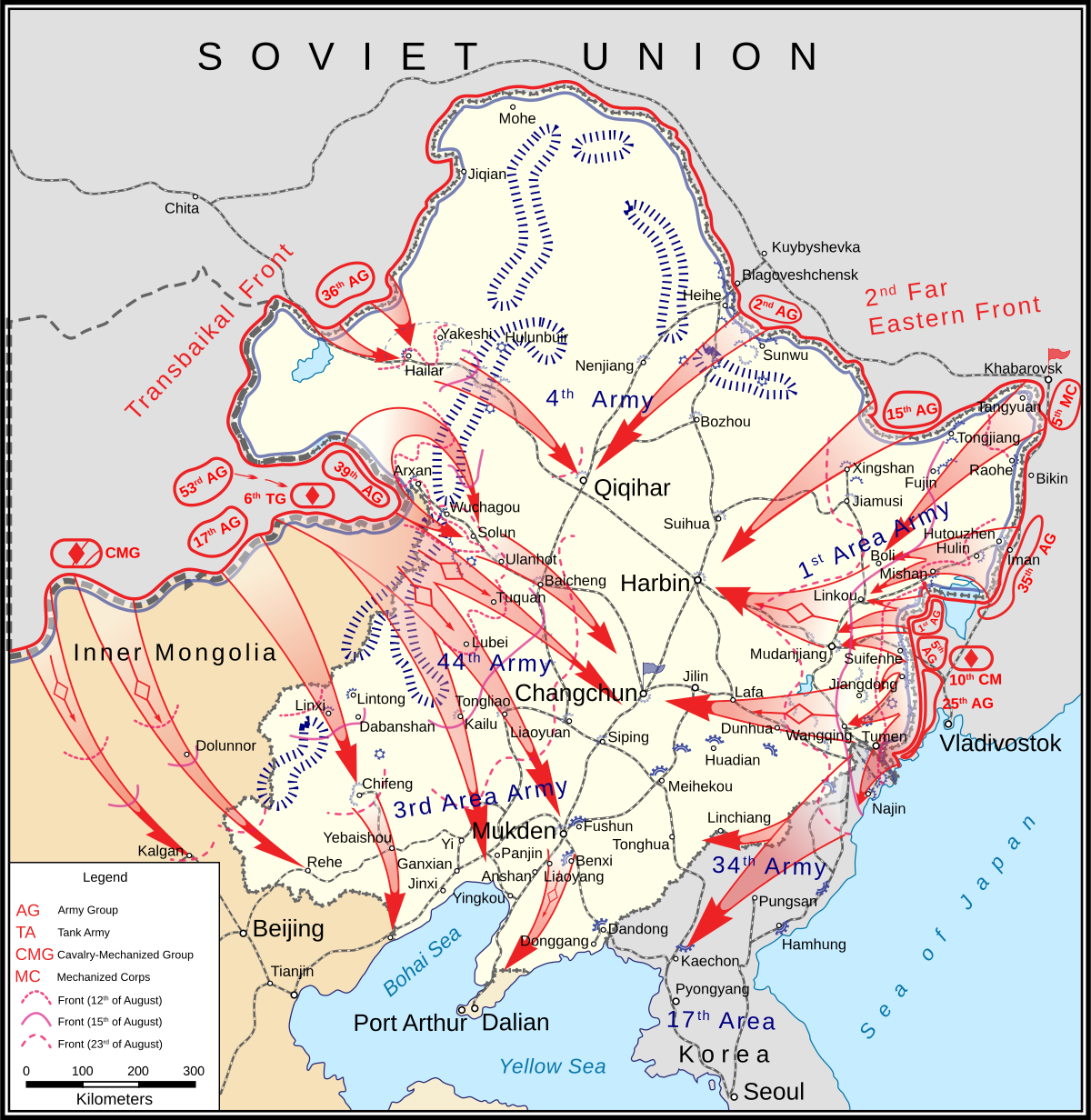
We like to think of our system as one in which the supremacy of civilian leaders acts as a rational, moderating force on military decisions. The needless atomic bombing of Hiroshima and Nagasaki — against the wishes of World War II’s most revered military leaders — tells us otherwise.
Embrace of Sinister Principle
Sadly, the destructive effects of the Hiroshima myth aren’t confined to Americans’ understanding of events in August 1945. “There are hints and notes of the Hiroshima myth that persist all through modern times,” State Department whistleblower and author Peter Van Buren said on “The Scott Horton Show”.
The Hiroshima myth fosters a depraved indifference to civilian casualties associated with U.S. actions abroad, whether it is women and children slaughtered in a drone strike in Afghanistan, hundreds of thousands dead in an unwarranted invasion of Iraq, or a baby who dies for lack of imported medicine in US-sanctioned Iran.
Ultimately, to embrace the Hiroshima myth is to embrace a truly sinister principle: That, in the correct circumstances, it is right for governments to intentionally harm innocent civilians. Whether the harm is inflicted by bombs or sanctions, it is a philosophy that mirrors the morality of al Qaeda.
That’s not the only thread connecting 1945 to 2023, as Truman’s insistence on unconditional surrender is echoed by the Biden administration’s utter disinterest in pursuing a negotiated peace in Ukraine.
Today, confronting an adversary with 6000 nuclear warheads — each a thousand times more powerful than the bombs dropped on Japan — Biden’s own stubborn perpetuation of war puts us all at risk of sharing the fate of Hiroshima and Nagasaki’s innocents.
Brian McGlinchey is an independent journalist who covers issues on Substack, including economics, history, tax policy, criminal justice, foreign policy, politics, the War on Terror and current events. His journalism career began with the 2014 launch of 28Pages.org, which helped to declassify 28 pages describing connections between Saudi government officials and individuals associated with the 9/11 plot. He wrote a series of exposés on a Saudi lobbying campaign against the Justice Against Survivors of Terrorism Act (JASTA).
The views expressed are solely those of the author and may or may not reflect those of Consortium News.

This is a very well argued and informative article. It however says nothing about what was going on inside Japan, which is what really matters.
There is a cult of militarism that has to be experienced first hand to really get what is going on. Having lived in Japan I can tell you that many Japanese homes contain a shrine dedicated to a katana, and at some high schools military uniforms are required to be worn daily. I saw a WWII torpedo on display in a Shinto shrine. All this is nothing compared with how it was in 1945. Japanese troops didn’t surrender no matter how hopeless their position. They preferred death by flamethrower, of all such methods the most painful. On Okinawa many civilians killed themselves rather than be conquered. On mainland Japan little children were being trained to strap explosives to their bodies then hurl themselves under the treads of invading tanks.
As a mountainous island nation Japan has great natural defenses. While it is true that only a miracle could have saved them at that point, such miracles have happened before. China under Kublai Khan attempted to invade Japan. Their had overwhelming military might but a storm, the famed kamikaze[divine wind], sent the ships to the bottom of the sea. Kublai tried it again seven years later and it happened again. That might make you a believer. Just think, in World War II little Japan waged war against China, the USA, and the then-formidable British Empire all at the same time. You’d have to believe in a mystical destiny to embark on such an audacious course.
There was a meeting in the Palace after the bomb. The civilians and emperor argued for surrender and the military for continuing the war. The military had the power so the war went on. Note that if Japan were occupied the brass were honor bound to commit suicide, which at least some of them later did. It was the ultimate conflict of interest : if the surrender goes through I have to kill myself. Tojo shot himself in the chest but survived, much to his disappointment.
After Nagasaki the emperor decided to go directly to the people. He recorded a surrender message to be broadcast the next day. Some young officers went to the palace, sliced off the head of the captain of the guard, and searched for the recording in order to destroy it, but it was not found. In the morning one of the officers went to the radio station with his katana to prevent the broadcast. The announcer told him to wake up, Japan is finished, it’s all over, get out of here you dreamer, you fool. The officer went to a peaceful place and cut his own belly open.
That’s enough of this sad, terribly sad story.
I fear the case is more than a “depraved indifference to civilian casualties.” For four long years the American press had depicted Japanese people as animalistic subhumans, as grinning, buck-toothed, bespectacled monkeys or slithering slant-eyed snakes, in caricatures as horrific as the worst published of Jews in Germany’s lowest gutter press – d’ya suppose pure old murderous racist hatred – a constant all throughout America’s history – had anything at all to do with it?
Alperowitz in “Decision to Use the Atomic Bomb” reported that Groves said in March of 44 “the Bomb is for Russia” Ok, now let’s ask how General G knew that…
I had long believed that the decision to use the bombs, though the wrong decision, was an honestly made mistake. With documented proof otherwise, as presented here, I’m now more cynical about humanity than I was a half hour ago. And also more frightened than before by the sick bastards at the core of “permanent US dominance.”
‘… “permanent US dominance.” Did this start when Britain tried to defeat the American colonists? They didn’t want any powers dominating the Americans ever again?
Additional evidence to to support the view recounted by Leo Szilard is provided by a member of Robert Oppenheimer’s team of scientists working with General Leslie Groves on the Manhattan Project, Joseph Rotblat.
Rotblat recounts that Groves confided in him in 1944 that Germany was no longer working on the nuclear bomb, and that the real purpose for continuing with the Project was to “subdue Russia.” In other words, the purpose of bombing Japanese had nothing to do with saving America soldiers’ lives, and everything to do with impressing Russia. When Rotblat heard this, he no longer saw any justification for the Project and quit, the only scientist on the project managed, with great difficulty, to do so.
This story, and much more, is told in an excellent (free) movie, “The Strangest Dream,” produced by the National Film Board of Canada in 2008. This movie tells twice as much about what is worth knowing about the bomb, and in half the time, as Christopher Nolan’s blockbuster movie, “Oppenheimer.” Rotblat went on to win the Nobel Peace Prize in 1995, together with the Pugwash Conferences, an organization he founded. “Oppenheimer” may be more entertaining to the popcorn-eating crowd, but it is ethically deficient.
Not so “The Strangest Dream.”
Well stated Randal. You open a can of worms though> When Groves said that to Rotblat the Policy was that Russia was an ally. Roosevelt was alive. This contradiction implies the Groves was a member of an insubordinate gang…possibly the same gang that manipulated the removal of Wallace and the installation of a pliable cryptofascist and corrupt (in small ways) Truman. Planning to attack an ally in wartime might be seen as treason. Is this the same gang to did Dallas? 911? Maidan Coup and the Ukie nazis … Is there a continuity? Who, after the war, did not go to jail, eh? Thanks Randal!
The rest of the Manhattan Project scientists carried on working on it even after Germany was defeated. They also thought there was a risk that an atomic detonation could ignite the atmosphere and thus destroy all advanced life on the planet. Nor did they show any obvious concern about the health risks to those living near the test explosion.
Despite all this, they went ahead anyway!
Thanks for the reference, here’s a link:
hxxps://www.nfb.ca/film/strangest_dream/#:~:text=This%20is%20a%20documentary%20on,have%20inspired%20thoughtful%20people%20everywhere.
Harry Truman and Joe Biden seem a lot alike. Two empty headed men who glory in their own stupidity and pettiness. But sadly, so many have died because of both of them.
The ” – Comes Around” part always comes around on its own schedule. Coming around, it will inevitably.
“But the two atomic bombings saved hundreds of thousands of lives!…”
By this logic we should immediately bomb and destroy the Pentagon and Langley Virginia as that would save millions of lives.
Back in the 80s I was discussing this with my boss who was retired full colonel in the army. He claimed it was 100% aimed at the Russians to make it clear that we had no problem killing civilians & that the second bomb was dropped to make them wonder how many more we had.
Thank you. I’ve read things similar to what you’ve broached here.
Thanks for the valuable info.
I’ve read things over the years that are similar to what you’ve broached here.
And, soon after the ‘successful tests’ the USA and UK planned to nuke Russia:
“The 1949 Dropshot plan envisaged that the US would attack Soviet Russia and drop at least 300 nuclear bombs and 20,000 tons of conventional bombs on 200 targets in 100 urban areas, including Moscow and Leningrad (St. Petersburg).”
World domination has no moral limits.
Thankfully cooler heads prevailed.
And the White House……….
Very true.
Great logic there Drew.
An excellent point!
excellent piece
thx
A fine article all in all. I was particularly heartened that the author drew this extremely-relevant connection to the present:
“…That’s not the only thread connecting 1945 to 2023, as Truman’s insistence on unconditional surrender is echoed by the Biden administration’s utter disinterest in pursuing a negotiated peace in Ukraine.”
The US and its Western vassal populations have been programmed to disregard the lives of those our governments abuse and murder for the profit of the business class. It has turned many of them into ghouls who only care for themselves regardless of the cost to others. The Western fake democracies need an intervention on a global scale to force the issue. With the backing of Russia and China, that is about to commence should we be so fortunate to survive the current insanity of the political class.
Notice how MSM is silent on this subject? NEVER FORGET WE DID THIS!!!
Hello,
Maybe it would be a good idea to give Gar Alperowitz credit for being one of the first to uncover the material that is included in this article. He wrote the book on atomic diplomacy in 1994. For that matter so did Martin Sherwin (who co-wrote Oppenheimer). Seems no one wants to give them credit for the work they did decades ago.
hxxps://portside.org/video/2023-07-21/lifting-fog-bombing-hiroshima-and-nagasaki
THE BOMBING OF HIROSHIMA AND NAGASAKI from Allan Siegel, tells the story behind the atomic bomb and the decision to use it against Japan. It includes interviews with historian Gar Alperowitz (“The Decision to Use the Atomic Bomb”) Martin Sherwin, the co-author of the Oppenheimer screenplay as well as historical re-enactments of the decision making process behind dropping the bomb.
Thankyou allan for the video link. I watched the first 5 minutes just now. It will surely be an informative piece from what i saw. I shall watch the rest tomorrow.
All of this just makes me very, very sad.
And, the really sick part is that the powers that be are still contemplating doing something like this again right now in Ukraine. We need to rid the world forever of the demonic forces in our governments who are supporting the continued use of these diabolical weapons.
Americans need to stop listening to the internal propaganda telling us of all the evil “out there” and instead realize the real evil is right in the heart of our very own country…
It is difficult to avoid the conclusion that Americans are not only sheep who can be manipulated at will but also terminally stupid because they cannot see how much their perpetual coma negatively affects their own lives. Given that situation asking them to recognize evil and act against it seems unrealistic.
We could try pessimism but that never works.
My thoughts exactly. As a species, we haven’t learned a thing. If anything we have got worse in our inhumanity, and it will destroy us if we don’t find away to reverse course quickly.
Simply evil
Anagram of evil: Simply vile.